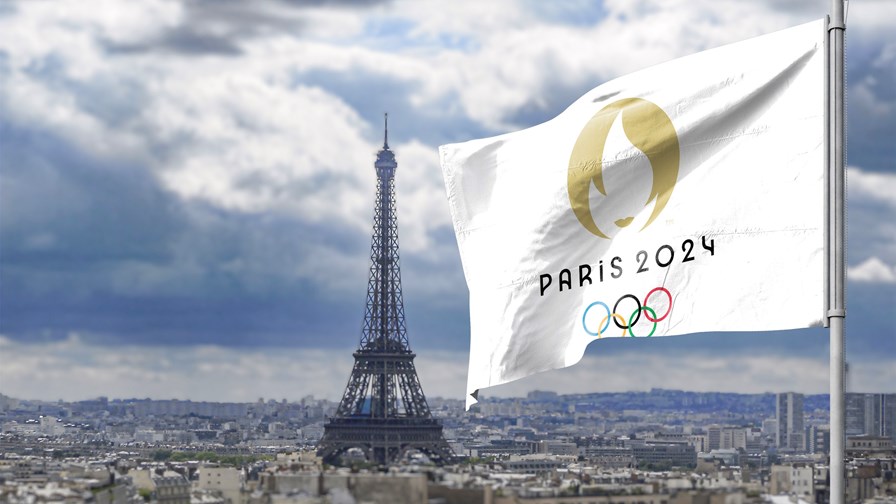
- Orange is the sole communications provider for the upcoming Olympic Games in France
- The operator has provided details about the technical arsenal it is deploying for the big sporting event
- After the event is over, the telco group plans to capture B2B opportunities based on the network and service capabilities deployed during the games
Orange is determined to cash in on the efforts it is making for the upcoming Olympics being held in France this summer, as it plans to pitch the communications networking and services capabilities it will demonstrate during the massive sporting event to enterprise customers.
As the Premium Partner and Official Supplier to the Paris Olympics Games 2024 (aka the Games of the XXXIII Olympiad), which run from 26 July to 11 August, the French incumbent telco is the only operator tasked with providing the official communications capabilities during the competition.
At a recent virtual media and analyst briefing, the telco presented its Olympic game plan and shared its vision to capture further opportunities in the business-to-business (B2B) sector once the games are over.
Bertrand Rojat, chief technology and information officer at Orange Events, explained that all the infrastructure and systems the operator is deploying for the event, including a fibre network, a full IP network, a private 5G network, a digital platform and other services, will be used to meet other customer requirements after the Olympics.
“We are actually already discussing with broadcasters to support them in the production of events”, Rojat noted.
“We have a life after the Olympics. That’s a very important element to us – both from a financial perspective, but also in terms of our engagement from an environmental perspective as well”, he added.
In response to a question from TelecomTV about the amount of investment that the company has made to deploy its networks and services for the Olympics, Rojat did not disclose figures but stated that “most of the investments we are making are legacy investments”.
He noted that the operator is making use of “a strong legacy” of capabilities which can be used by its B2B customers, as Orange Business has “a great portfolio of international customers that would benefit from these technologies”.
Furthermore, these technologies have been developed and deployed with the objective of being made available to other customers, including potentially consumer users too, according to Rojat.
The re-use strategy comes at an important time for the telco group, which in the past few years has focused on revamping its business services strategy and revitalising its business services division under the leadership of Aliette Mousnier-Lompré – see Orange to go big on digital services to revive ailing enterprise division.
Jumping through hoops
During the briefing, Orange outlined how it plans to deliver what it considers “the most connected competition in the Games’ history”.
Notably, the company will be the sole communications provider for the Paris Olympics, unlike previous editions such as the Tokyo Olympics in 2021 when connectivity was provided by five operators.
In the 2024 Olympics, the network will rely on two main pillars. The first one comprises a unified IP network that has capacity of 100Gbit/s, includes around 100,000 internet interconnections, and is spread around 60 venues. In addition, there will be a B2B network of around 10,000 Wi-Fi access points for members of the media, technical staff and the organising committee, but not for the general public attending the games, as “in France, we don’t use Wi-Fi, we use mobile networks”, Rojat explained.
The second pillar is the all-important mobile infrastructure, which has been enhanced to deliver reliable connectivity at all times. The mobile network is being deployed in two ways: At permanent venues, Orange has deployed “state-of-the-art” technologies which include a “dynamic mechanism” to optimise spectrum and maximise the capacity at the sites; while at temporary venues, the company is adding 50 mobile connectivity units across 32 locations, to meet the needs of the organisers and the public.
In addition to the networks, Orange will also provide a push-to-talk (PTT) communications service that will be enabled on 13,000 devices. The goal is for staff members, the Olympic committee, athlete teams, volunteers, health and safety, and security teams to be able to communicate easily and securely. The PTT devices are set to be connected with priority over the public network using a “special mechanism” on the company’s 4G network.
For spectators, the telco is providing audio commentary and a chatbot to help them understand the rules of the games.
Orange also highlighted the deployment of a 5G standalone (SA) network which will be used by broadcasters during the event.
The telco further stated that it is deploying its biggest-ever team dedicated to a specific event, with more than 1,000 staff members operating on the venues throughout the Olympics.
- Yanitsa Boyadzhieva, Deputy Editor, TelecomTV
Email Newsletters
Sign up to receive TelecomTV's top news and videos, plus exclusive subscriber-only content direct to your inbox.




